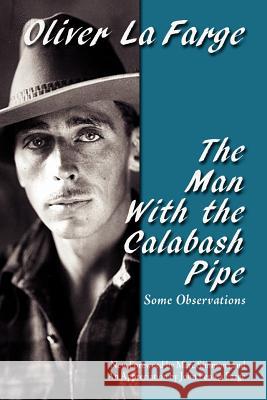The Man with the Calabash Pipe » książka
The Man with the Calabash Pipe
ISBN-13: 9780865346796 / Angielski / Miękka / 2011 / 300 str.
The Man with the Calabash Pipe
ISBN-13: 9780865346796 / Angielski / Miękka / 2011 / 300 str.
(netto: 97,56 VAT: 5%)
Najniższa cena z 30 dni: 101,02
ok. 16-18 dni roboczych.
Darmowa dostawa!
From 1950 until just before his death in 1963, Pulitzer Prize-winner La Farge wrote weekly columns for "The Santa Fe New Mexican." This edition collects the writings as edited by his friend, Winfield Townley Scott.
From 1950 until just before his death in 1963, Pulitzer Prize winner (for Laughing Boy) Oliver La Farge wrote weekly columns for The Santa Fe New Mexican-a total of some 350,000 words. A collection of these writings was edited in 1966 by his friend, Winfield Townley Scott and published as "The Man With the Calabash Pipe." As Scott says in his introduction, "Though often in the background, and with much said relevant to anywhere in America, a strong sense of place permeates these essays, whatever their matter. The Southwest in general, Santa Fe in particular, became his locus classicus-or his pulpit." Sometimes the "observations" that take place in some of the pieces in this collection are between La Farge and his alter ego, the "Man With the Calabash Pipe," thus the title of the book, and they are marvels of rueful humor. In others the author enjoys his talks with his imaginary friend, Horned Husband Kachina Chief from Awatovi. In writing about Santa Fe, La Farge scolded, reprimanded, corrected, reminded, berated, bemoaned, rejoiced in, and urged on the town in a dozen moods, always out of a fierce devotion. His comments on "Writing the Language" are salutatory as well as amusing. Then, in and out of these essays wanders that Man With the Calabash Pipe-a sardonic bachelor who refuses to light his heater since a likeable mouse is in residence underneath it. Scott continues, "...I think any reader who never had to the luck to know Oliver La Farge will touch the man as nowhere else in his work save perhaps that revealing autobiography, Raw Material; and will be touched and will come to feel the overtones of a unique, complex individual." Born in 1901, Oliver Hazard Perry La Farge is ranked among the literary lions of Southwestern letters. Since he died in 1963, his reputation has continued to grow and new honors have been added to his name. "Laughing Boy," a novel of Navajo life, won the Pulitzer Prize in 1930, putting his name in lights before he was 30.











